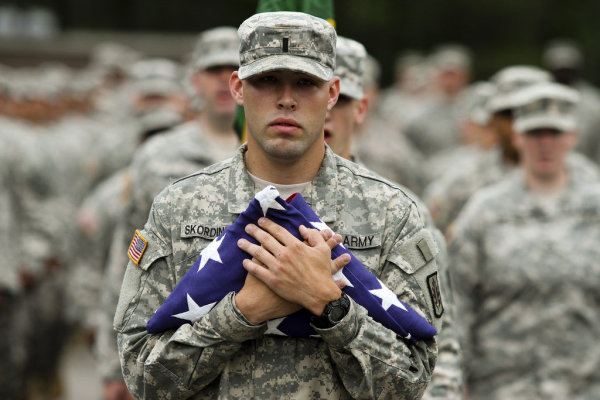

I’ve always been intrigued by the civilian-military divide. Over the years, my thoughts on it have shifted from frustrated anger to muted acceptance. Today, I’m much more skeptical of the phenomenon, but see the civilian-military divide chiefly as an individual problem, not a societal one. A good friend once pointed out that she never thought of herself as a “civilian” until a veteran pointed out to her that that is, in fact, what she is.
Something I didn’t quite realize while I was going to college was just how much agency I had as a student veteran. I understood that I was older, more experienced, and more mature than my classmates. I felt like I could carry a conversation with professors and faculty as a quasi-peer by virtue of my military and wartime experience. And what I am learning now — as a veteran who went to college only to rejoin the military again afterwards — is how incredibly important the role of student veteran is in shaping civilians’ perceptions of the military.
More than anyone else, the student veteran has the ability to influence civilians’ impressions of the military, for good or for ill.
In 2009, at a student-veteran club meeting, I looked up at one of the new student veterans as he entered the room. He was wearing a deployment t-shirt. (Units often have them made toward the end of a deployment to commemorate the experience.) On the back was a map of Iraq, his unit designation, and emblazoned in blood red over the map, the words: WHILE YOU WERE CHILLIN’ WE WERE KILLIN.
That t-shirt continues to stick out in my mind as a symbol of the civilian-military divide. Those Marines (they had to be Marines) who created that shirt design chose to define their deployment experience not by what they did, but in juxtaposition to what civilians back home were doing. In this case, “chillin.”
For college students in New York City, the military seems more of an abstract concept than a tangible organization filled with real people. To many, the military is stigmatized as the violent arm of American foreign policy, comprised of mostly minorities from the rural South and Midwest, probably from impoverished backgrounds — young men and women who had no better options after high school. To have served in the military means you likely hold right-leaning political beliefs and are a supporter of the wars in Iraq and Afghanistan. Of course, not everyone thinks this, but on more than one occasion upon meeting a fellow student or faculty member that was the web I walked into.
In the student-veteran club, we used to joke about the veterans who did this:
Veteran: “Hi, I’m Sean. I was in the Marines, served two tours in Iraq.”
Civilian: “Uh, hi, I’m Michelle.”
Veteran: “Yeah, this is my first semester. I’m thinking about going back to do a little contracting in the summer.”
Civilian: “Okay, I have to get to class.”
As a student veteran navigating my way through college, I made a concerted effort to branch out and meet people, especially non-veterans. I often withheld telling new friends that I had been in the Army, even though it felt like I was misleading them by not divulging that information immediately. In fact, when they’d find out days or weeks or months later, they’d often ask, “Why didn’t you tell me you were in the military?” I used to respond with “Well, I didn’t want your opinion of me to be colored by the fact that I was in the military.” I thought I was doing myself a favor, but I’ve come to realize that I simply wasn’t trusting them to make decisions for themselves. I was afraid of being stereotyped, and that fear led me to occasionally hide or at least tuck away my military service when I should have been more forthright.
Being a veteran is a pretty major identity, whether we like it or not. My peers at school saw me as “the Army guy” no matter what other activities I got myself into or how well I did in class. My service identified me. Once I understood and accepted that, I felt an added pressure to represent myself well, because the Army and the military would be judged by my actions as a student veteran, simply because for most of the civilians I interacted with, I was as close as they would ever get to the military.
Thanks to the Post-9/11 GI Bill, veterans are filtering out of the military and choosing to go to college in record numbers. This puts them in direct contact and on equal ground with other young Americans who, with few exceptions, will never interact with the military. This provides the student veteran with a unique opportunity, and obligation, to be the singular force that shapes fellow students’ views of the military outside of movies and video games.
Over the years, I’ve been told by numerous people that their perceptions of the military have changed significantly because of the veterans they’ve met — especially thoughtful student veterans.
When people argue on how to bridge the civilian-military divide, they usually discuss unrealistic notions, like a return to the draft or some kind of mandated post-high school service. Being a good and informative student veteran is actually something that veterans can do right now. There is no better place to bridge the civilian-military divide than on a college campus, where meeting diverse groups of people, experimentation, and critical thinking are all encouraged.
Be polite, be humble, have an open mind, and be successful. Individual student veterans can have a tremendous impact on people, and even institutions. There is no better feeling than hearing someone who was once vehemently anti-military say that his perception of the military has changed because of you.